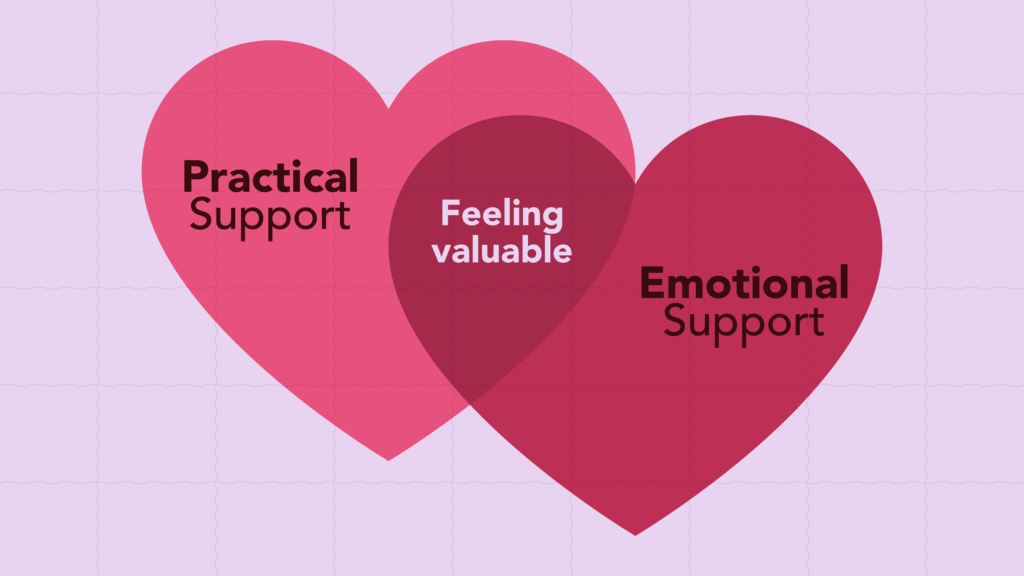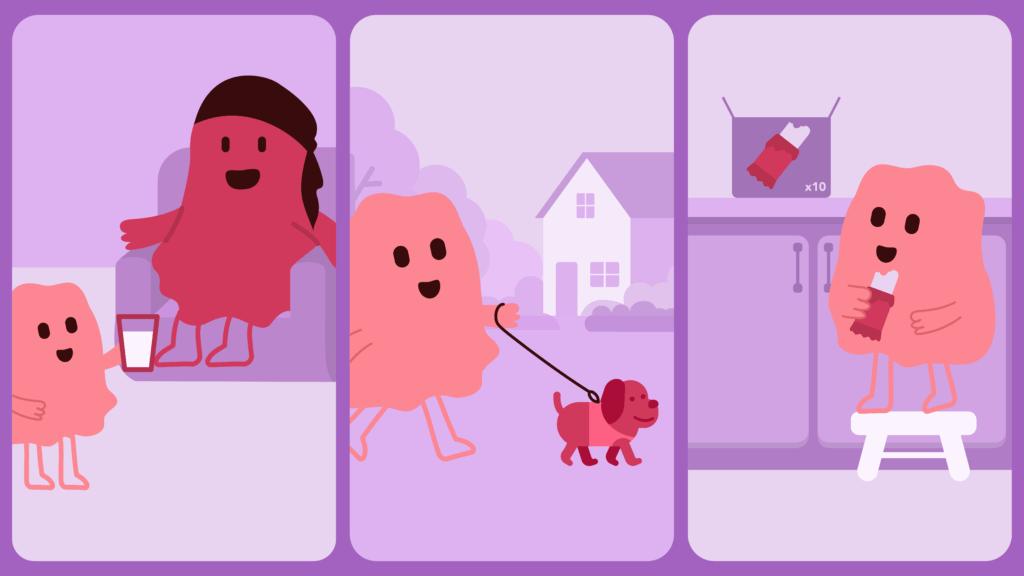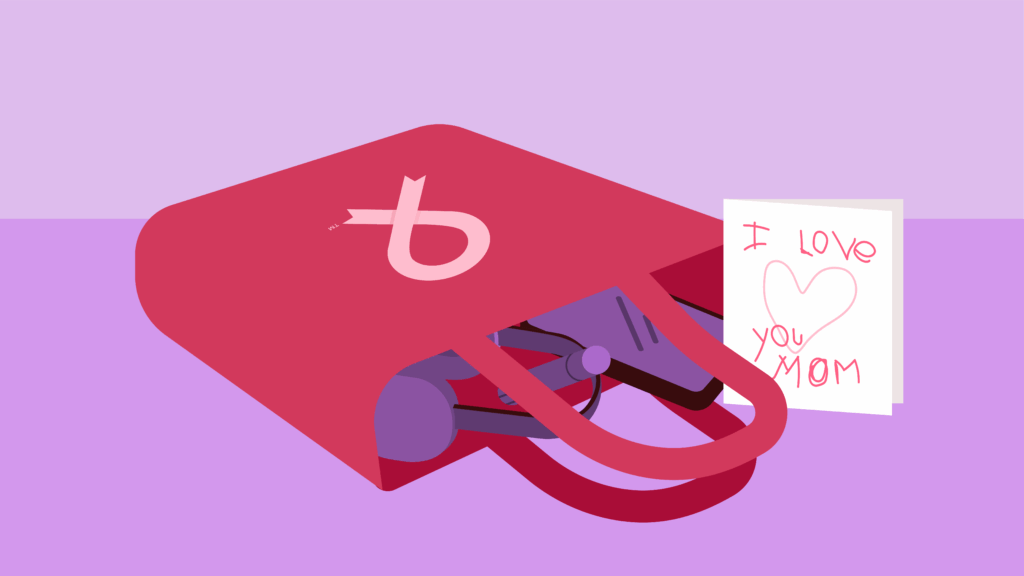


Additional free resources for families facing cancer can be found at nbcf.org/parents. Click here to download a printer-friendly version of this blog post.
When a parent is diagnosed with cancer, saying the words “I have cancer” to their children can be distressing and emotionally taxing, for both parents and kids. In fact, when a parent has cancer, a child can view it as “their” combined experience. In these situations, it’s important to offer kids healthy and age-appropriate outlets to express their feelings and to feel involved in the healing process.
If you are facing a diagnosis, there are some practical and concrete ways to help your children feel more in control of what may feel like an uncontrollable situation. After sharing the news of your diagnosis with them, having continuous open and honest conversations about what is happening and providing them with opportunities to help in both hands-on and emotional ways can bring them a sense of hope, accomplishment, and comfort.
Kids of all ages can participate in practical and emotional support for a parent who is facing cancer. This type of support from kids can help them feel valuable and like they are contributing to your wellness, without the pressure of having to perform or hide their experience to make things easier.

Remember, school-aged kids’ main job is to be a kid! This includes going to school, participating in after-school activities, and maintaining friendships. Kids help their parents the most when they keep up these kid jobs. Thanking and praising them each time they do their kid jobs and any other tasks and activities you ask of them will build their self-esteem and confidence.
However, circumstances may sometimes require kids to take over some age-appropriate tasks. Some kids may even find helping out while their parent has cancer to be comforting for not only their parent, but for themselves as well. This is where kids can offer their parent and family some practical support, with the intention of helping them emotionally connect and cope with their new normal while also being a helpful member of the family support team.
When discussing ways kids can “help” and support a parent with cancer, it’s essential to realize that every kid will react differently, and not every kid will find the idea appealing or comforting. While some kids may be motivated by new responsibilities available to them, others may find it overwhelming or feel resentful of any extra burden placed on them. In these situations, it may be best to tailor the experience and requests to your child’s comfort level as much as possible.
When offering opportunities for children to help with the physical and emotional challenges of a parent’s cancer diagnosis, it is important to respect their limits and stage of development. Keep the following in mind:
Simply put, not every kid will want to help every time, and that’s okay. Take their emotional state into account when suggesting ways they can help. Is your child tired, sad, angry, or frustrated? If so, consider letting the suggested task go for the moment and circle back later. However, if you truly need their help in the moment, explain why and encourage their cooperation. This can sound like: “I know you’re having a rough day, and I’m not feeling very good today either. But tomorrow is trash day. Will you please take the trash out now? Then we can cuddle up for a movie on the couch and rest.”
Generally speaking, kids respond well to direct and clear statements. An instruction to “help around the house” is pretty vague, but switching to “vacuum every other day” or “water the plants twice a week” are examples of tasks kids can more easily grasp and implement. The same goes for family and friends who ask what they can do to help.
Taking a strengths-based approach may also be helpful in engaging and encouraging kids. Try to set tasks that play to your child’s strengths and are achievable for them in order for them to feel confident and empowered.
Play is a great form of expression and a wonderful way to let off some steam. Incorporate regular play and breaks into your kids’ schedules to keep them active and engaged. Remember, one of your child’s main “kid jobs” is to maintain friendships and connections with others. During your treatment, you can encourage this by asking friends to have your kids over to their house for playdates with their peers. Many people are looking for ways to help, and requesting or accepting playdates is a great way to involve them.
Ask your kids how they are doing, what they would like to help with, and what they need from you. Frequent emotional check-ins will help everyone stay on the same page and be able to address any issues before they become bigger or more complex problems.
For kids who may be motivated to take on additional responsibilities during this time, either as a way to support their parent and family or as a way to help them channel their anxiety and give them a sense of control, simple hands-on tasks that are not already part of their normal chore routine may be helpful.
But remember, when circumstances require kids to take over an age-appropriate task, or when they choose to do so themselves, it’s important to validate their feelings about having the added responsibility and express your appreciation for their cooperation.

Here are some ways kids can offer meaningful, practical support to a parent facing cancer:
Many children may already be doing regular household chores as part of their everyday life and responsibilities. But when cancer enters a household, it can disrupt the normal flow and routines, necessitating a redistribution of responsibilities. It’s helpful to maintain existing responsibilities of a child, such as keeping their spaces tidy and helping with light, age-appropriate chores. Consider having a conversation about what has changed and what can be adjusted or re-worked to maintain some order.
If your child is able and open to take on more responsibilities at this time, offering them choices of chores can be motivating and empowering. A way to start this conversation may sound like, “I know it’s really frustrating when the house is messier than normal. We can work together as a family to address that. What are some ways you would like to help?”
Have your child take over some or all of pet care duties, from taking the dog on a walk to cleaning out the litter box and making sure pets are fed on a regular schedule. Pet care can save you a lot of time and energy and provide a fun outlet for your kids at the same time!
When you are recovering from treatment, such as surgery or chemotherapy, your children may be concerned to see you as more vulnerable than usual. Giving them easy ways to help bring you physical comfort can bring them comfort as well. Asking them to bring you your water to stay hydrated, adding an extra blanket to tuck you in to rest, or even having them help you get up from the couch can be a much-needed boost for you both.
It may be helpful to have a system in place that will keep your family updated on your day-to-day health status and what they can expect as a result. One way to do this is with a stoplight system:
Depending on their age, your kids might be able to make some snacks or meals on their own, for you or for themselves. Placing snack items, ingredients, and cooking utensils at your child’s eye level can help set them up for success for grabbing their own after-school snack or making a simple dinner of grilled cheese, mac and cheese, or a bagged salad.
If your kids are old enough to drive, they may be able to help with simple errands, such as dropping off a package, picking up a few groceries, or transporting younger siblings to practices or playdates. This option is not only a huge time- and energy-saver for you, it’s a great way to foster a sense of responsibility and caring for others in older adolescents.

The goal of giving kids practical and developmentally appropriate ways to help a parent with cancer is to give them a sense of purpose and control in what may feel like uncertain times, as well as saving you, the patient, some precious time and energy. But be sure to remind them that it is not their job to make you feel better and that all you really need from them are their snuggles, hugs, and kisses. And remember to thank them for their kindness and let them know how much you appreciate them and their efforts.
When times feel tough and sensitive, families can work together to provide emotional support to one another. Kids might find it meaningful to take part in activities that reduce stress and improve connection within the family. Ideas for emotional support include:
Ask them to tell you a joke a day. It will give your kids something to think about and look forward to while offering some levity for all. Laughing together is a great way to reduce stress and strengthen emotional bonds.
Remind your kids that hugs and handholding are some of the best gifts they can offer you right now. You can even make it fun by creating a secret signal that means either of you needs a hug.
Sometimes during treatment, it may not be possible or advisable to receive much physical interaction from your kids or anyone else. For example, if you are recovering from surgery and have pain or are immunocompromised from treatment. In these times, kids can still physically and emotionally connect through giving “air hugs and kisses,” or even connecting your feet together (rather than holding hands) while watching a movie or TV show from opposite ends of the couch.
Encourage your kids to make a card, sing a song, or draw a picture for you when you’re heading to treatment. Drawing pictures or otherwise being creative is a great way for kids to express their feelings about the world around them.
Looking for creative ideas? Download these free coloring sheets, designed for families facing cancer, for some fun and relaxing quality time together.
Share three things you are grateful for each day with each other. These can be written in a gratitude journal you keep together or shared aloud at a certain time of day.
Playtime can give kids an outlet to channel both their physical energy and any emotional anxiety they may be feeling. It’s also a great way for parents and kids to connect. But when you are in treatment, playtime with your kids may look different. Keep in mind that playing doesn’t have to be physically demanding if you don’t feel up to it. Instead, you can draw or color together, play a card game, or even try your hand at their favorite video game.
If your family is religious, saying a daily prayer for health, healing, and peace can be of great comfort to children and adults alike. Likewise, meditating or practicing mindfulness together can also be a source of peace and comfort. Taking deep breaths together before bed can also be helpful to everyone to reduce stress and foster connection.

While there is no perfect roadmap for involving and connecting with your kids following a cancer diagnosis, listening to their concerns and answering their questions are some of the best things you can do to guide them through this difficult season of life. Sharing a mixture of practical and emotional support ideas can help strengthen their confidence and sense of purpose as they are reminded that they are an important and valued member of your family, even when times are tough.
NBCF is here for parents facing cancer; you are not alone in this journey. For more free resources to help guide children through a parent’s cancer diagnosis, read:
In addition to NBCF, there are other groups dedicated to the emotional well-being of children and families who have a parent facing cancer. Below are a few organizations to consider partnering with on this journey.
Caring Bridge
Dana-Farber Cancer Institute
St. Jude Children’s Research Hospital
Webinar: ABCD LEAP Speaker Series – Parenting Through Cancer, Carissa Hodgson, LCSW, OSW-C
National Breast Cancer Foundation is here for you as you navigate a breast cancer diagnosis. Visit our website to learn about NBCF breast cancer support groups, obtain free educational resources, or find a patient navigator in your area.
Donations are always appreciated, but there are lots of great ways to get involved.